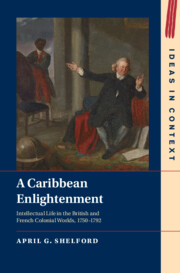Book contents
- A Caribbean Enlightenment
- Ideas in Context
- A Caribbean Enlightenment
- Copyright page
- Dedication
- Contents
- Figures
- Maps
- Tables
- Acknowledgments
- Note on the Text
- Abbreviations
- Chapter 1 What Is a Caribbean Enlightenment?
- Part I Before Breadfruit
- Part II Creating Enlightened Citizens
- Introduction to Part II
- Chapter 4 Making the Affiches, Making Americans
- Chapter 5 American Exceptionalism, Political Economy, and the Postwar Order in the Journal de Saint-Domingue
- Chapter 6 A Slave Named Voltaire; or, Gender and the Making of American Taste
- Conclusion to Part II
- Part III Tristram in the Tropics: or, Reading in Jamaica
- Part IV Cultivating Knowledge
- Bibliography
- Index
Chapter 5 - American Exceptionalism, Political Economy, and the Postwar Order in the Journal de Saint-Domingue
from Part II - Creating Enlightened Citizens
Published online by Cambridge University Press: 14 September 2023
- A Caribbean Enlightenment
- Ideas in Context
- A Caribbean Enlightenment
- Copyright page
- Dedication
- Contents
- Figures
- Maps
- Tables
- Acknowledgments
- Note on the Text
- Abbreviations
- Chapter 1 What Is a Caribbean Enlightenment?
- Part I Before Breadfruit
- Part II Creating Enlightened Citizens
- Introduction to Part II
- Chapter 4 Making the Affiches, Making Americans
- Chapter 5 American Exceptionalism, Political Economy, and the Postwar Order in the Journal de Saint-Domingue
- Chapter 6 A Slave Named Voltaire; or, Gender and the Making of American Taste
- Conclusion to Part II
- Part III Tristram in the Tropics: or, Reading in Jamaica
- Part IV Cultivating Knowledge
- Bibliography
- Index
Summary
The Journal de Saint-Domingue joined the Affiches Américaines in encouraging White male colonists to consider themselves members of an “enlightened” and distinctively “American” citizenry devoted to reason and the common good. While acknowledging metropolitan precedents for a general-interest publication, its editors trumpeted their publication’s novelty, claimed all of “America” as their journalistic jurisdiction, and stated their intention to generate original content, not just reprint metropolitan articles. The monthly Journal fostered the creation of American “taste” by publishing reviews and critiquing poetry by colonists. With strong ties to the local Chambres d’Agriculture and strong support from planter subscribers, it also published extensively on agriculture (Chapter 11). With the Affiches, it created a forum where colonists could appropriate the intellectually respectable terms of “political economy,” combining them with a robust rhetoric of citizenship to respond to criticism from merchants and metropolitan chambers of commerce; debate the reimposition of the trade restrictions of the Exclusif and proposed limitations on sugar refining; and seek to redefine the colony-metropole relationship.
Keywords
- Type
- Chapter
- Information
- A Caribbean EnlightenmentIntellectual Life in the British and French Colonial Worlds, 1750–1792, pp. 125 - 142Publisher: Cambridge University PressPrint publication year: 2023

